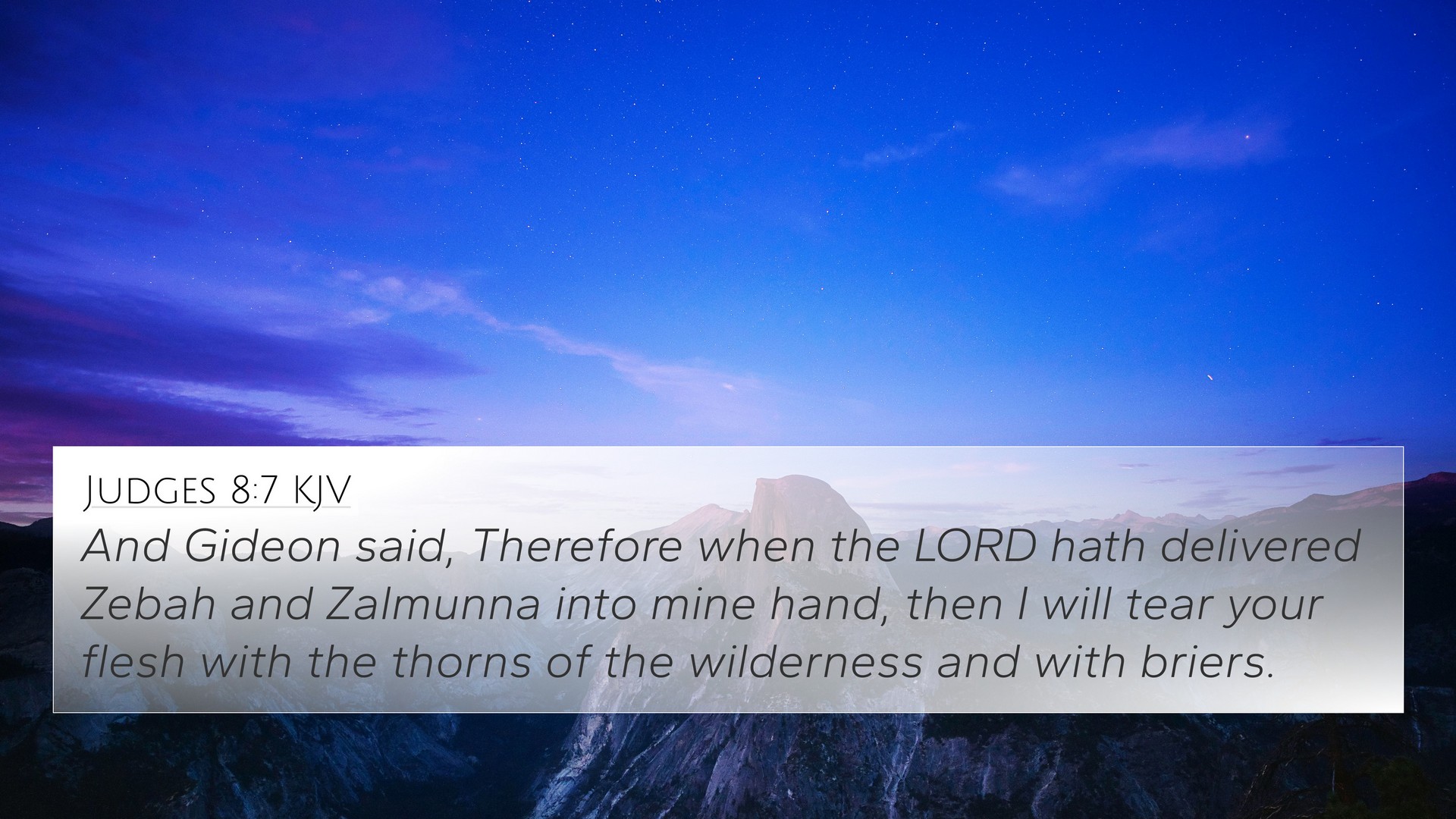Bible Verse Meaning: Judges 8:7
Judges 8:7 states: "And Gideon said, Therefore when the LORD hath delivered Zeba and Zalmunna into mine hand, then I will tear your flesh with the thorns of the wilderness and with briers." This verse captures the essence of Gideon's response to the people of Succoth for their refusal to help him in his pursuit of the Midianite kings. Below is a detailed interpretation of this verse, integrating insights from various public domain commentaries.
Summary and Analysis
The verse speaks to the themes of vengeance, divine justice, and the serious consequences of disrespect and distrust of God's providence. Gideon, as a military leader ordained by God, seeks to show the consequences of the Succoth people’s refusal to assist him based on their fear of Midianite retaliation.
Insights from Commentaries
-
Matthew Henry:
Henry emphasizes the strength of God's deliverance and how Gideon's words reflect a commitment to execute divine justice upon those who undermine his mission. He notes the severity of Gideon's imagined punishment as indicative of the righteous anger towards those who do not support God's appointed leaders.
-
Albert Barnes:
Barnes interprets the reply of Gideon as a poignant warning against disbelief and cowardice. He suggests that the thorns and briers represent the painful consequences one can face when they choose to oppose God’s anointed and divine direction. Gideon's statement serves as a reminder to the Israelites of the perilous nature of their lack of faith.
-
Adam Clarke:
Clarke expands upon the cultural context of Gideon's threats, framing them within the justice of ancient wartime conduct. He acknowledges the fear that the Succoth people had of the Midianites but argues against their negligence of aiding Gideon, who was working under God’s direct command. He sees Gideon’s reaction as justifiable given the circumstances and highlights the importance of supporting God's plans.
Bible Verse Cross-References
Understanding Judges 8:7 is enhanced when cross-referenced with other scripture. Here are some notable Bible verses that relate to Gideon's situation and sentiments:
- Judges 6:14: God commissions Gideon, establishing his authority and purpose.
- Judges 8:1: The conflict with Ephraim reflects the internal discord among Israelite tribes.
- Hebrews 11:32-34: Gideon is mentioned as a man of faith, showcasing his pivotal role in Israel's deliverance.
- Psalm 119:101: This verse emphasizes the value of following God’s instruction, paralleling the lack of adherence shown by Succoth.
- Matthew 12:28: The New Testament invocations of divine authority resonate with Gideon’s assertion of God’s power in battle.
- Luke 9:5: Jesus instructs the disciples to shake off the dust from their feet as a sign against those who reject the message, mirroring Gideon’s pronouncement against Succoth.
- 1 Timothy 5:20: This encourages the correction of those who err in faith, linking to Gideon’s role in administering justice.
Thematic Connections Between Verses
The narrative in Judges presents a powerful revenge theme often seen in divine strategies throughout the scripture. Gideon’s righteous anger aligns with earlier accounts of Israel’s leaders delivering justice as guided by God. Here are some themes worth noting:
- Divine Authority: Gideon acts under God’s command, reinforcing the concept that God appoints leaders to carry out His will.
- Faith vs. Fear: Illustrates the dichotomy between those who trust in God’s promise and those who let fear overcome their faith.
- Consequences of Inaction: The response of Succoth serves as a warning to all believers about the repercussions of failing to support God’s endeavors.
Conclusion
Judges 8:7 serves as a grave reminder of the costs associated with faithlessness and disobedience. By examining context, complementary verses, and thematic lessons, one can appreciate the layered meaning behind Gideon's warning to Succoth. The narrative encourages readers to reflect on their support of God's work through appropriate action and belief.



